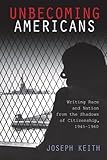Unbecoming Americans : Writing Race and Nation from the Shadows of Citizenship, 1945-1960 / Joseph Keith.
Material type: TextSeries: The American Literatures InitiativePublisher: New Brunswick, NJ : Rutgers University Press, [2013]Copyright date: ©2013Description: 1 online resource (240 p.)Content type:
TextSeries: The American Literatures InitiativePublisher: New Brunswick, NJ : Rutgers University Press, [2013]Copyright date: ©2013Description: 1 online resource (240 p.)Content type: - 9780813559667
- 9780813559681
- American literature -- History and criticism -- 20th century
- American literature -- Minority authors -- History and criticism
- American literature -- 20th century -- History and criticism
- Citizenship in literature
- Immigrants' writings, American -- History and criticism
- Race in literature
- LITERARY CRITICISM / General
- 810.9920693 23
- online - DeGruyter
- Issued also in print.
| Item type | Current library | Call number | URL | Status | Notes | Barcode | |
|---|---|---|---|---|---|---|---|
 eBook
eBook
|
Biblioteca "Angelicum" Pont. Univ. S.Tommaso d'Aquino Nuvola online | online - DeGruyter (Browse shelf(Opens below)) | Online access | Not for loan (Accesso limitato) | Accesso per gli utenti autorizzati / Access for authorized users | (dgr)9780813559681 |
restricted access online access with authorization star
http://purl.org/coar/access_right/c_16ec
During the Cold War, Ellis Island no longer served as the largest port of entry for immigrants, but as a prison for holding aliens the state wished to deport. The government criminalized those it considered un-assimilable (from left-wing intellectuals and black radicals to racialized migrant laborers) through the denial, annulment, and curtailment of citizenship and its rights. The island, ceasing to represent the iconic ideal of immigrant America, came to symbolize its very limits. Unbecoming Americans sets out to recover the shadow narratives of un-American writers forged out of the racial and political limits of citizenship. In this collection of Afro-Caribbean, Filipino, and African American writers-C.L.R. James, Carlos Bulosan, Claudia Jones, and Richard Wright-Joseph Keith examines how they used their exclusion from the nation, a condition he terms "alienage," as a standpoint from which to imagine alternative global solidarities and to interrogate the contradictions of the United States as a country, a republic, and an empire at the dawn of the "American Century." Building on scholarship linking the forms of the novel to those of the nation, the book explores how these writers employed alternative aesthetic forms, including memoir, cultural criticism, and travel narrative, to contest prevailing notions of race, nation, and citizenship. Ultimately they produced a vital counter-discourse of freedom in opposition to the new formations of empire emerging in the years after World War II, forms that continue to shape our world today.
Issued also in print.
Mode of access: Internet via World Wide Web.
In English.
Description based on online resource; title from PDF title page (publisher's Web site, viewed 24. Mai 2022)


